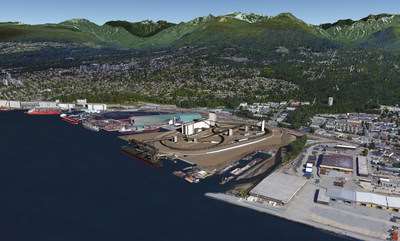The facility is expected to be completed in 2020
By Diego Flammini
Assistant Editor, North American Content
Farms.com
G3 Global Holdings announced its plans to build a new grain export terminal in North Vancouver, British Columbia.
The facility, which will be the first new grain terminal built at the Port of Vancouver since the 1960s, will be able to accommodate three 134-car trains and store over 180,000 metric tonnes of cereal grains, oilseeds, pulses and special crops.
It will feature a rail loop track, allowing trains to unload in continuous motion before traveling back to other elevators.

A rendering of the G3 terminal in North Vancouver.
Photo: G3
Other features include 48 concrete storage silos with an overhead conveyor system for distributing commodities, a grain cleaning facility and a dust aspiration system that collects grain dust and converts some of it into a pelletized item to be sold to the local animal feed industry.
"Our Vancouver terminal is central to G3's vision of a coast-to-coast grain handling network that sets a new standard in efficiency," Karl Gerrand, G3 CEO, said in a release. "We plan to transform the movement of grain through the west coast, providing Canadian farmers with competitive pricing and reliable delivery opportunities."
Construction is scheduled to begin in March 2017 and wrap up in 2020.